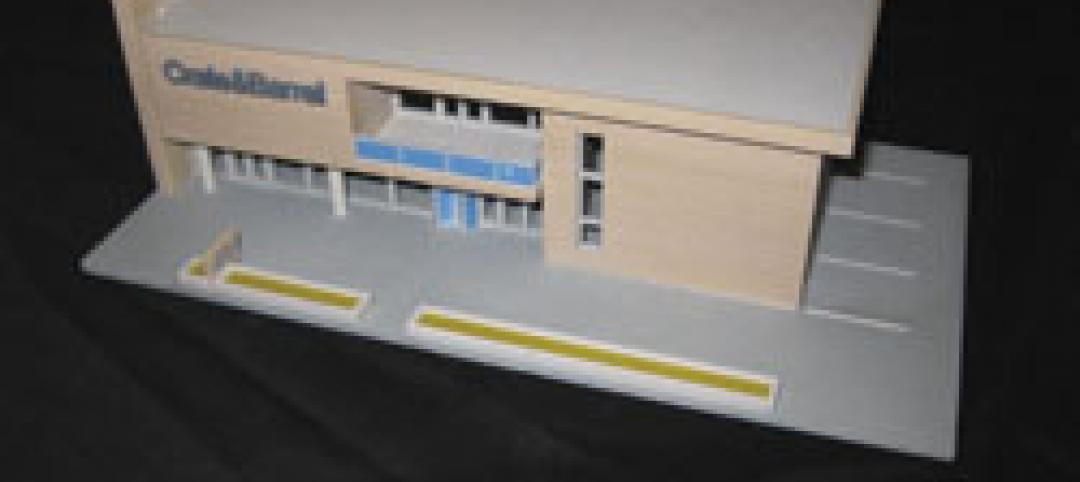Dow Building Solutions announced two Research and Development (R&D) test facilities located at the Dow Building Solutions’ North American headquarters in Midland, Mich.
The R&D “Wall Assembly Research Center” and “Spray Foam Application Technology Research Facility” have been built to test and evaluate insulation, air sealing and weatherization systems in a controlled lab environment in order to provide customers with real-world data of how the products will work together and perform and function in the field.
The Wall Assembly Research Center is a 1,600 sf wall system research lab that has over 30 interchangeable wall sections that enables Dow to test various residential and commercial wall systems.
It also allows for the testing of exterior wall system components to see how they stand up to outside elements and perform in a cold climate zone. Systems being tested include rigid and spray insulations, exterior cladding, and various framing techniques, in all cardinal directions.
The Wall Assembly Research Center is wired with a state-of-the-art monitoring system that allows researchers to collect, analyze and process the performance of each of these interchangeable wall systems over extended periods of time.
Dow collaborated very closely with Building Science Corporation to design and construct this unique facility in a way that the data collected can help further develop Dow building envelope products and systems and provide answers to the most relevant industry questions.
The second research test facility is a 2,000 sf spray booth and lab that enables researchers to evaluate the application of new spray foam chemistries and methods. The Spray Foam Application Technology Research Facility was created to test liquid-applied construction solutions and materials, such as spray polyurethane foams and weatherproofing systems, to help better understand how spray products work in both small and large-scale applications while using a variety of application equipment such as refillable cylinders and 2-component high-press spray rigs. Beyond testing and gathering data on chemistries and application methodologies, the research facility is also being used to provide education and training on the application and safe handling of these spray foam products that contribute to the creation of a better performing building envelope. BD+C
Related Stories
| Sep 13, 2010
World's busiest land port also to be its greenest
A larger, more efficient, and supergreen border crossing facility is planned for the San Ysidro (Calif.) Port of Entry to better handle the more than 100,000 people who cross the U.S.-Mexico border there each day.
| Sep 13, 2010
Triple-LEED for Engineering Firm's HQ
With more than 250 LEED projects in the works, Enermodal Engineering is Canada's most prolific green building consulting firm. In 2007, with the firm outgrowing its home office in Kitchener, Ont., the decision was made go all out with a new green building. The goal: triple Platinum for New Construction, Commercial Interiors, and Existing Buildings: O&M.
| Sep 13, 2010
Stadium Scores Big with Cowboys' Fans
Jerry Jones, controversial billionaire owner of the Dallas Cowboys, wanted the team's new stadium in Arlington, Texas, to really amp up the fan experience. The organization spent $1.2 billion building a massive three-million-sf arena that seats 80,000 (with room for another 20,000) and has more than 300 private suites, some at field level-a first for an NFL stadium.
| Sep 13, 2010
'A Model for the Entire Industry'
How a university and its Building Team forged a relationship with 'the toughest building authority in the country' to bring a replacement hospital in early and under budget.
| Sep 13, 2010
Committed to the Core
How a forward-looking city government, a growth-minded university, a developer with vision, and a determined Building Team are breathing life into downtown Phoenix.
| Sep 13, 2010
Conquering a Mountain of Construction Challenges
Brutal winter weather, shortages of materials, escalating costs, occasional visits from the local bear population-all these were joys this Building Team experienced working a new resort high up in the Sierra Nevada.
| Sep 13, 2010
Data Centers Keeping Energy, Security in Check
Power consumption for data centers doubled from 2000 and 2006, and it is anticipated to double again by 2011, making these mission-critical facilities the nation's largest commercial user of electric power. With major technology companies investing heavily in new data centers, it's no wonder Building Teams see these mission-critical facilities as a golden opportunity, and why they are working hard to keep energy costs at data centers in check.
| Sep 13, 2010
3D Prototyping Goes Low-cost
Today’s less costly 3D color printers are attracting the attention of AEC firms looking to rapidly prototype designs and communicate design intent to clients.
| Aug 11, 2010
Cubellis principals reorganize as CI design
Former principals of Cubellis Inc. have formed ci design "with a stellar group of projects in the United States and internationally," states John Larsen who, with Richard Rankin and Christopher Ladd, is leading the architecture and planning firm.
| Aug 11, 2010
Leo A Daly changes name of STH, completes acquisition
LEO A DALY has changed the name of STH Architectural Group to the name of its parent company, Leo A Daly. STH was acquired in February 2009 as a strategic move to accelerate growth in its core business sectors and to strengthen the firm's presence in the Florida market.















